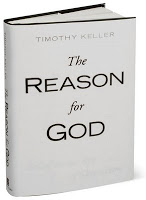Book Review: “Cold-Case Christianity” by J. Warner Wallace
I’m going to admit my bias at the onset on this review. I
heard Jim Warner Wallace of Please Convince Me speak on this material at the Apologetics Canada Conference in 2012, almost a
year before his book released. I was ready to dig into anything he put into
print because I so enjoyed his crime scene investigator-type presentation. So,
when I had the opportunity to review his book, I was excited to do so! And
Wallace’s book did not disappoint.
topics as Wallace. One of the main
questions I field after giving a presentation on the reliability of the
transmission of the New Testament is, “But why should I trust the authors who
wrote these letters?” More specifically, the question usually refers to “how
can I know these authors were telling the truth?” Jim Warner Wallace’s book, Cold-Case Christianity sets out to
answer this question, as well as make a cumulative case for the Christian faith.
Wallace approaches the New Testament as a cold-case homicide
detective looking at the circumstantial evidence for the veracity of the Gospel
stories. Part of that endeavor includes establishing the trustworthiness of the
eyewitness testimony. Wallace utilizes the same standards he would apply in establishing
eyewitness testimony in court with the authors of the Gospels to discern
whether or not there was a conspiracy afoot.
disciples of Jesus (and the authors of the Gospels) were involved in a
conspiracy—directly combatting the popular-level claims of internet movies,
“The God Who Wasn’t There,” and “Zeitgeist: The Movie.”
communicate with one another in a quick or thorough manner. They were dispersed
far from one another across the Roman Empire, and interrogated and martyred far
away from one another.
conspiratorial lies for an incredibly long time.
one another prior to their time together as disciples of Jesus. This reason stems from Wallace’s professional crime investigation observation of why
conspirators stick to or give up on their stories. One of the sticking points
is how close they are relationally with the co-conspirators. The closer the
relationship, the more likely the conspirators are to stick to the conspiracy
story.
The apostles, however were aggressively persecuted as they were scattered from
Italy to India.
Wallace states, “I can’t imagine a less favorable set of circumstances for a
successful conspiracy than those that the twelve apostles faced.” Granted, one could conceivably imagine a less
favorable set of circumstances or one could still conceivably imagine the
possibility that the authors were co-conspirators. However, Wallace is after
reasonable evidence, not possibilities. It’s the actual evidence he can use in a
cold-case trial; he cannot use the possible scenarios for which he lacks evidence.
evidence, and what is admissible as evidence, is what makes up the first half
of the book. This is what gives his work weightiness and offers a unique and
fresh perspective. He doesn’t just make a cumulative case argument for belief
in God, he spends much time in establishing how a cumulative case works to
provide reasonable evidence for a verdict. The first half of his work stands in
defiance to hyper-skepticism. It helps the reader to see problems with their
way of thinking about the evidence available. Dallas Willard once said
(paraphrased), “Not only should you doubt your beliefs and believe your doubts,
but you also have to be willing to doubt your doubts and believe your
beliefs.” Jim Warner Wallace provides a
stepping-off point to help people understand the trustworthiness of the Gospel
authors so they can move towards “doubting their doubts” and “believing their
beliefs.”
The second half of the book moves into establishing the trustworthiness of the
Gospel authors using the criteria laid out in the first half. This is the
evidential section in which the details are given and the sources are brought
to light. I would have liked more in this section, but I understand why there
is not more: as a writer, you have to stop somewhere. This second half could potentially involve volumes and volumes
of works. Wallace does provide, however,
a “chain of custody” of the writings of the New Testament authors as passed down
from the
original writers—Matthew, Mark, Luke, and John—to their disciples, and
their disciples’ disciples, and so forth, all the way up to the Council of
Laodicea in the fourth century. Here, Wallace refutes the argument that we
cannot really know the story of Jesus, because all we have today are copies of
copies of copies that have been drastically altered over the years; such as
argued by New Testament scholar, Bart Ehrman.
The cold-case theme of this book, its
crime-scene investigation tactics, the focus on establishing a case from
circumstantial evidence, and the stories used to relay each concept all come
together to make this an effective and powerful resource. I highly recommend
this book. It would be good to read with fellow believers, seekers, skeptics,
or anyone who has questions about the trustworthiness of the Gospel authors.
Plus, it has great cultural appeal in that it conveys its message in a language that matches the current fascination with criminal
investigation television shows. Consider using it for homeschooling associations, church discipleship classes, small group study, book clubs, and seminary/university courses.
 |
|
| Picking up an extra copy for a friend! |
I hope
you will pick up a copy of this book for yourself and one to share with someone
else!
MJ
– Jim is the newest member of Stand to Reason Ministries! Congrats, Jim!





 Five Sacred Crossings: A Novel Approach to a Reasonable Faith
Five Sacred Crossings: A Novel Approach to a Reasonable Faith